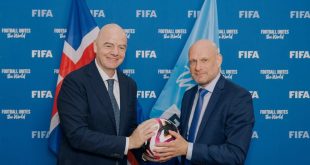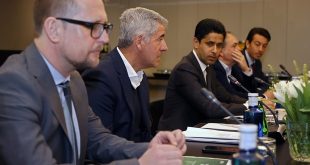 A recipient of a UEFA research grant for 2019/20, Dr Rahela Jurkovic talked to UEFA Direct about the importance of football for refugees.
A recipient of a UEFA research grant for 2019/20, Dr Rahela Jurkovic talked to UEFA Direct about the importance of football for refugees.
Dr Rahela Jurkovic was one of six recipients of a UEFA research grant for 2019/20 for a project titled ‘Football and refugees: cultural anthropology of the Balkan corridor’.
With the results of her research now presented to the UEFA Research Grant Jury, Dr Jurkovic talked to UEFA Direct about the importance of football for refugees and asylum seekers in Croatia, Bosnia and Herzegovina, Greece, North Macedonia and Serbia.
What led you into this area of research?
The first trigger was the fact that for my doctoral dissertation – on the integration of refugees in Croatian society – I found out that football is one way to integrate people and that many refugees in Croatia play football. The second was that in 2015 and 2016, there were over 600,000 refugees and asylum seekers who passed through the ‘Balkan corridor’, so my idea was to research those countries. In cultural anthropology, which is my field, sport hasn’t been researched a lot, but I received support from the Croatian Football Federation, which suggested I research other countries too.
How challenging was the process of going out in the field?
The research period was eight months, from September 2019 to April this year, and I had to cover five countries. I had some assistance from interpreters – cultural mediators, let’s say – but the main work was done by myself. In Greece, I had only one or two contacts. I went first to Thessaloníki, and was walking around thinking, “How am I going to find migrants who play football?” But a key contact – a ‘gatekeeper’ as we call them in cultural anthropology – helped me, and I was able to reach more than I’d targeted. In total, I interviewed 71 refugees in these five countries and 13 people working with refugees and football.
Did those interviews confirm your expectations or throw up surprises?
I was surprised. In Greece, where there are many more refugees and asylum seekers than in Croatia, I was surprised to see refugees who are playing football three times a day. I even heard of a few training with top-flight clubs. But my second surprise was that they had many difficulties in registering with local clubs. Registration is done by the national associations, but I heard that in Greece from 2015 to October last year, when we did the interviews, there were only four refugees registered with local teams. I spoke to many who wanted to be registered – they’re so happy to play football but are unhappy because they can’t show their talents on the field.
Was it encouraging to encounter different organisations that help refugees?
Of course, and one of my recommendations to UEFA and football in general was to support organisations trying to reach more people in this way. My report mentioned some of the people working across the five countries, such as Hope Refugee FC and Hestia FC in Athens. Hestia is the only women’s football club in the region. In Thessaloníki, there’s the Football for All initiative and the Arsis organisation. In Belgrade, I was with NGOs called Info Park and ADRA Community Centre. In Croatia, I met Mazen, a man who’s organising an informal group of people to help refugees through football. They all need support, though. A team like Hope Refugee FC, run by the International Olympic Truce Centre in Athens, needs finances to work. If you want something to function for refugees, you need people who are paid for their work. They’re working independently from the national associations, with money from different sources, but in the middle of each year they need to dedicate time to finding new funding. I hope my research shows that organisations behind football teams like Hope Refugee and Hestia are serious, with dedicated people. They’re an example, and I’d like to see bigger football bodies encourage them in their work.
Did your research leave you feeling optimistic or pessimistic?
I’m optimistic because I saw many talented people, people who want to show that, through football, they can do something. There are people with organisational capabilities who showed they can play football even though they had no equipment. Nobody organised them; they organised themselves. In Athens, I saw a woman from Iran who started playing football at almost 40, and this was great for me – it breaks the prejudice that women should play only when they’re young. I heard stories of women who’d played football in Iran wearing the hijab, and they said it was much better to play without. There were also women from Afghanistan playing football in Hestia. Every one of them told me how football had helped them overcome depression and psychological problems. One woman cried after talking about how her life was before she joined this women’s football club. In the end we were all crying.
How do you hope your research might influence people?
I hope it will help raise awareness of the fact that refugees in Southeast Europe play football. Some spend up to four years in camps, and they play football. But they need equipment, they need organised training sessions, and my suggestion to national associations and local football clubs is that they contact refugee centres and ask if they can help. Also, I hope I’ve offered examples of good practice – and that these organisations should have long-term support. “Finally, there is the question of registration in local clubs and how national regulations could be amended to allow asylum seekers to register, as FIFA regulations actually stipulate. One interviewee in Athens told me: “You’re allowed to work with asylum papers but cannot play football. How is this? How do you give us the right to work but not to play?”
 Arunava about Football A look at football & the world through my eyes!
Arunava about Football A look at football & the world through my eyes!



